WL Central wrote on July 7:
NSA whistleblower Edward Snowden has now been offered asylum in three American countries: Bolivia, Nicaragua, and Venezuela. He has applied for asylum in six additional countries, according to WikiLeaks. And his chances for reaching a safe haven are growing further because of US interference in the process, according to Michael Bochenek, director of law and policy at Amnesty International.
-
-
The Bolivian presidential plane finally left Vienna Airport July 3, at 5.30am (Bolivian time). This after a 14 hour period during which President Evo Morales was literally kidnapped and his plane interrupted in mid-flight without explanation, putting Bolivian president’s life in danger. Four countries — France, Spain, Italy and Portugal — revoked flight permission while the plane was taking Morales and other officials home from an energy conference in Moscow.
-
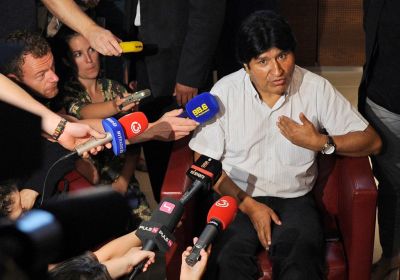 Imagine the aircraft of the president of France being forced down in Latin America on “suspicion” that it was carrying a political refugee to safety — and not just any refugee but someone who has provided the people of the world with proof of criminal activity on an epic scale.
Imagine the aircraft of the president of France being forced down in Latin America on “suspicion” that it was carrying a political refugee to safety — and not just any refugee but someone who has provided the people of the world with proof of criminal activity on an epic scale. -
The Network of Intellectuals and Artists in Defense of Humanity express their indignation at the criminal attack perpetrated in the afternoon of Tuesday July 3 against Bolivian President Evo Morales Ayma, by the government of the United States and with the clear complicity of various European states.
-
Venezuela and Bolivia have agreed to raise cooperation to a “higher level” following Venezuelan president Nicolas Maduro’s visit to Bolivia on May 25. During bilateral meetings held in Cochabamba, Maduro and Bolivian President Evo Morales signed key accords in food production, industrial development and communications. “It’s necessary to place the strategic map of bilateral cooperation at a higher level, including a more organised one,” said Maduro.
-
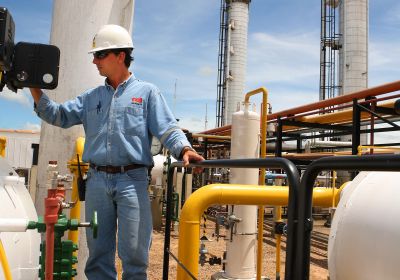 Bolivia is demonstrating to the world why nationalising natural resources is a crucial first step for any government seeking to put people and the environment before profits. On May 1, 2006, less than four months after becoming president, Evo Morales decreed the nationalisation of the country’s gas reserves. This move restored state control over the strategic resource.
Bolivia is demonstrating to the world why nationalising natural resources is a crucial first step for any government seeking to put people and the environment before profits. On May 1, 2006, less than four months after becoming president, Evo Morales decreed the nationalisation of the country’s gas reserves. This move restored state control over the strategic resource. -
Bolivia has earned more than US$16 billion from the energy industry since President Evo Morales nationalised the sector in 2006, Spanish newsagency EFE reported government officials as saying. EFE reported that hydrocarbons minister Juan Jose Sosa said: “Seven years before the nationalisation, from 1999 to 2005, the state received around $2 billion. After these seven years, the state received more than $16 billion.” EFE said: “Morales issued an executive order on May 1, 2006, nationalising the seven oil companies, the majority of them foreign firms, operating in Bolivia.”
-
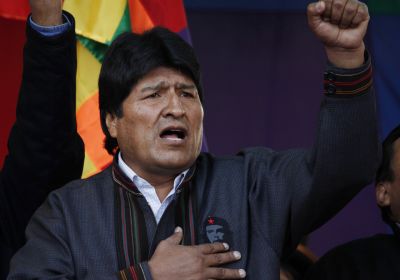 Bolivian President Evo Morales told a May Day demonstration in La Paz that his government would expel the US Agency for International Development (USAID), the BBC said that day. The US government-funded agency provides funds and training to groups around the world that support US interests. In countries such as Bolivia and Venezuela, USAID has funded groups involved in bids to bring down elected governments.
Bolivian President Evo Morales told a May Day demonstration in La Paz that his government would expel the US Agency for International Development (USAID), the BBC said that day. The US government-funded agency provides funds and training to groups around the world that support US interests. In countries such as Bolivia and Venezuela, USAID has funded groups involved in bids to bring down elected governments. -
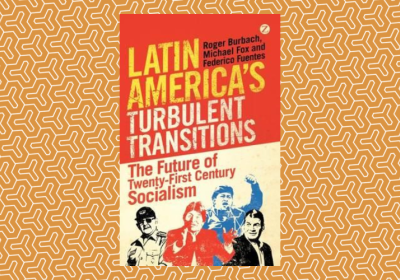
In a quirk of history, Margaret Thatcher died a little more than one month after Hugo Chavez. Thatcher was a figurehead for the global class war in the 1980s and '90s known as “neoliberalism”. Chavez was a figurehead for the struggle against it and the alternative starting to be built in Latin America over the past decade.
-
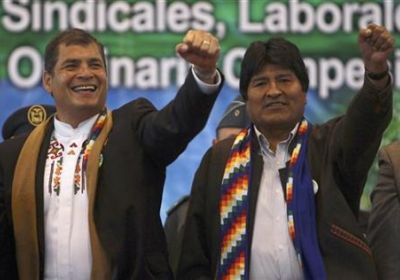 Katu Arkonada, a researcher at the University of the Cordillera in La Paz, Bolivia, gives a 2012 balance sheet of Bolivia's achievements and challenges. It was translated from Spanish with additional notes by Richard Fidler and is reprinted from Bolivia Rising. ***
Katu Arkonada, a researcher at the University of the Cordillera in La Paz, Bolivia, gives a 2012 balance sheet of Bolivia's achievements and challenges. It was translated from Spanish with additional notes by Richard Fidler and is reprinted from Bolivia Rising. *** -
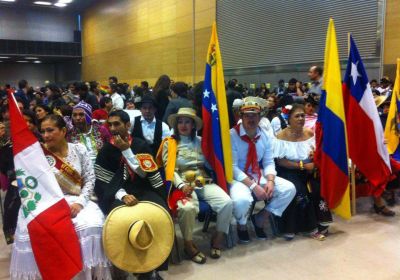 About 7000 people joined the “International Meeting with Social Movements” festival in Barcelona on December 9, which features Bolivia's left-wing President President Evo Morales, the Andean nation;'s first ever indigenous president. The event was largely attended by the Bolivian diaspora, many of whom travelled hours from Madrid and Valencia. However, flags of Catalonia, Palestine and Argentina reflected a broad internationalist gathering.
About 7000 people joined the “International Meeting with Social Movements” festival in Barcelona on December 9, which features Bolivia's left-wing President President Evo Morales, the Andean nation;'s first ever indigenous president. The event was largely attended by the Bolivian diaspora, many of whom travelled hours from Madrid and Valencia. However, flags of Catalonia, Palestine and Argentina reflected a broad internationalist gathering. -
In an effort to assert control over national resources Bolivia has nationalized two Spanish electricity distribution companies. The measure, on the eve of a new year, comes as an example of initiatives to secure the interests of people. Reuters reported on December 29 that the nationalisation that day of two electricity distribution companies owned by Spanish utility Iberdrola were “the latest move by leftist President Evo Morales to assert control over the country's resources”.